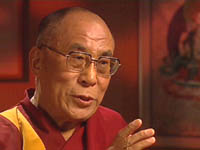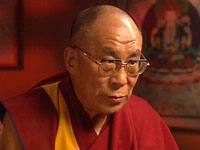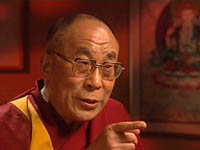
INDEPTH: THE DALAI LAMA
Interview
CBC News Online | April 16, 2004
Interviewer: Hana Gartner
From The National April 19, 2004
Since he arrived in Canada this weekend, people can't seem to get enough of the smiling monk with the rock star appeal, and it's no secret why. Behind that grin is one of the most influential voices in the world. The Dalai Lama is the exiled spiritual leader of Tibet, a disciple of non-violence and a living icon. He spoke with the CBC's Hana Gartner.
Hana Gartner: He calls himself a simple Buddhist monk. And that's how he arrived in Vancouver. No fanfare, no official welcome. Just some faithful followers anxious to get a glimpse of His Holiness, the 14th Dalai Lama. He'll meet with government leaders who finally decided they would see him despite China's objections. When he's in the States, this Nobel Peace Prize winner gets the star treatment. Presidents and celebrities line up to get a private audience and a picture. Tibet's exiled spiritual and temporal leader has become an icon. His message of peace and happiness is more self-help than religion, and that is turning his books into bestsellers and turning him into a celebrity. Why is there this hunger for a spiritual hero?
 Dalai Lama: That's an unrealistic expectation! Of course, usually... Of course, the peace of friendship is in everybody's interest. Everybody loves that. Everybody wants that. My approach is to analyse our life and also analyse the world of our emotions, analyse. Through awareness, you get a certain attitude. That's the way, you see, to achieve more peaceful, more compassion, more friendship through that way.
Dalai Lama: That's an unrealistic expectation! Of course, usually... Of course, the peace of friendship is in everybody's interest. Everybody loves that. Everybody wants that. My approach is to analyse our life and also analyse the world of our emotions, analyse. Through awareness, you get a certain attitude. That's the way, you see, to achieve more peaceful, more compassion, more friendship through that way.
Hana Gartner: In China, they don't think of you as a hero. You have accused the Chinese government of cultural genocide. Why is it that no world leader, including our own, stands beside you and says, I support him? Why is it they treat you like some kind of a political hot potato?
Dalai Lama: Many leaders actually are showing genuine sympathy. Also, whenever they have appropriate time, they always raise Tibetan issues. Now Tibetan issues means human rights violations and also the preservation of Tibetan culture, heritage, these kinds of things.
Hana Gartner: Why can't they do it out front? Why do they have to say to the world, we're only seeing him as a spiritual leader, we're really not seeing him as a political leader?
Dalai Lama: For me also, that's better.
Hana Gartner: It is?
Dalai Lama: My own sort of case, 80 per cent... I think 80 per cent of my energy and time is spent on spiritual field. I always introduce myself as a Buddhist monk. Nothing else. So when someone, they consider me as a Buddhist monk, I'm very happy. If someone considers me as a politician, that's not very correct.
Hana Gartner: You're not comfortable with that robe of a politician. You're less comfortable with it?
Dalai Lama: I am not a politician. A kind of sort of work which I'm involved is national struggle. Freedom struggle.
Hana Gartner: That's political. That's very political.
 Dalai Lama: And also, now, here, my main concern for Tibet is preservation of Tibetan culture, preservation of Tibetan spirituality. I'm not much concerned about political field, whatever political status, OK, so long the preservation of Tibetan culture, preservation of Tibetan spirituality and environment fulfilled, then political status doesn't matter. Not much important. Personally, I have no interest in the political status of these things. I made it very clear, I think in '92, I made it very clear, when time comes for our return with certainty of freedom, then I will hand it over, all my religious authority to the local government. I have nothing to ask about myself.
Dalai Lama: And also, now, here, my main concern for Tibet is preservation of Tibetan culture, preservation of Tibetan spirituality. I'm not much concerned about political field, whatever political status, OK, so long the preservation of Tibetan culture, preservation of Tibetan spirituality and environment fulfilled, then political status doesn't matter. Not much important. Personally, I have no interest in the political status of these things. I made it very clear, I think in '92, I made it very clear, when time comes for our return with certainty of freedom, then I will hand it over, all my religious authority to the local government. I have nothing to ask about myself.
Hana Gartner: But I guess that's the question: when the time comes. There are a lot of young Tibetans who are now asking themselves, can you really fight force with faith? Can you overcome hate with hope? They've been trying that for half a century, and they say maybe it's not working. Maybe the middle way doesn't work. They would like freedom in this lifetime.
Dalai Lama: Yes, that is their argument. Of course, understandable. Not only young people, but even the elder people now more than 50 years since I left, since we've become refugees, in a lifetime, not shocked. Meantime, inside Tibet, even today, some sort of human rights violations, a degeneration about our culture or our spirituality and also environment. These things are happening.
Hana Gartner: With so many ethnic Chinese going into Tibet, now Tibetans are a minority in their own country.
Dalai Lama: So things are serious. So these other people, now more frustrations. So their patience now becomes thin like that. But I always used to telling them, more patience, more patience, and now, you see, here I am not fooling these people. I really feel, look global level. The later part of 20th century, much positive things changed. Much positive things happened. The totalitarian sort of systems, including Soviet Union, have changed. Now democratic society, although a lot of difficulties there. Now China, People's Republic of China, today's China, compare 30 years ago or 20 years ago, much changed. There are awareness about outside world and other values, including spirituality and individual freedom. Now these also begin in their mind. So these are some kind of peaceful evolution. Evolution gradually changes. This definitely will come. On the other hand, due to too much impatience, what we'll do, what could do? Fight?
Hana Gartner: Some want to.
Dalai Lama: Us? Fight? Self-destruction. Suicide. And whether we like it or not, in Tibet, they have to live side by side with our Chinese brothers and sisters. Now, in order to live harmoniously, happily, friendly, with mutual respect, we must carry our struggle through non-violence and try to achieve mutually agreeable solution. If we use common sense, I think that is the only way.
Hana Gartner: I keep interrupting you. I'm impatient. Forgive me.
Dalai Lama: You also represent those people who have less patience.
Hana Gartner: I'll work on it. I know that you believe that people are essentially benevolent and peaceful. You do. But then help me, as a parent, how do I explain to my children about 9/11, Madrid, Iraq, the Middle East, the horrible examples of anti-Semitism that we're experiencing right here?
Dalai Lama: Some crisis or violence here and there, it will always happen, always happen to human beings on this planet. This is a problem, all this happens. But then we have to look at whole picture. I think if you look at whole picture, I think today's world compared to early period 20th century, I think today much better, because I think awareness, I think, and because I think human way of thinking more widened.
Hana Gartner: But isn't it hard to tell somebody who is suffering who is in pain, be patient, it's going to get better? That's very hard.
Dalai Lama: Now two levels to come to these things. One, yes, we need immediate help to these people. Of course. On another level, we have to think how to prevent this in future. These two things are very important. Now, in some cases – now, for example – in the condemnation for terrorists, some using some violence. Yes, in particular circumstances, under particular circumstances, yes, it could be justified. However, this is not the full answer for long run.
Hana Gartner: But this is extraordinary. The Dalai Lama said violence under certain circumstances you could see as justified?
 Dalai Lama: Possible. Look, First World War, Second World War. I think Second World War, at least, although millions of people killed, suffer, immense, but really I was against war because war is some kind of legalized maximum violence. I'm always against. However, and like Second World War and Korean War, at least to protect the rest of the democratic civilization, and Korea, South Korea protected. As a result, more prosperity and democracy, freedom, these things. So sometimes... But then I think the difficult thing is when violence is started, eventually there's always a danger the situation become out of control, chain reaction, chain violence like Vietnam. All those same motivations, same strategy, same goal, but fail. Therefore, I always believe right from the beginning, must avoid violence.
Dalai Lama: Possible. Look, First World War, Second World War. I think Second World War, at least, although millions of people killed, suffer, immense, but really I was against war because war is some kind of legalized maximum violence. I'm always against. However, and like Second World War and Korean War, at least to protect the rest of the democratic civilization, and Korea, South Korea protected. As a result, more prosperity and democracy, freedom, these things. So sometimes... But then I think the difficult thing is when violence is started, eventually there's always a danger the situation become out of control, chain reaction, chain violence like Vietnam. All those same motivations, same strategy, same goal, but fail. Therefore, I always believe right from the beginning, must avoid violence.
Hana Gartner: But while you can concede that sometimes it's necessary, there are those in Tibet who believe there is justification that if you do not stand up, if you just are a pacifist, you empower the person who is oppressing you.
Dalai Lama: Individual case? For example, if mad dog coming, almost certain now bite you. Then if you say, non-violence, non-violence and compassionů
Hana Gartner: You get bitten!
Dalai Lama: That's kind of foolish! You have to take use of self-defence. But without harming, without serious harming another, I think that's the way I feel. If someone try to shoot on you, then there is no possibility to run away, then you have to hit back. Then possibly not on head, but leg or something like that. So that's not serious hit back, but more lenient way, more gentle way.
Hana Gartner:
Have you ever asked yourself if your spiritual message of compassion and forgiveness has undermined your success in the political field?
Dalai Lama: No. No, I don't.
Hana Gartner: You've never doubted... asked, did I do the right thing?
Dalai Lama: I have no sort of regret or I do not find in my major decisions, I do not find some mistake. Minor things. Later I found, oh, that's a mistake. But major decisions, now 55 years since I took responsibility, the major decision now seems right decision.
Hana Gartner: I thank you very much for your time.
Dalai Lama: Thank you.
Hana Gartner: It's a pleasure meeting you.
^TOP
|
|
 |
 MENU MENU |
|
|
 QUICK FACTS: QUICK FACTS: |
The name Dalai Lama means "Ocean of Wisdom".
In the fourteenth century Tsong-kha-pa led a reform movement in Tibetan
Buddhism and eventually founded a group of Buddhist monks known as the Yellow Hat or Gelupga order. In 1438, he founded a monastery at Tashilhundpo. His successor moved the order to Drepung, near the capital, Lhasa.
The third leader of the Gelupga order was a Mongol, Bsod-nams-rgya-mtsho, who
converted to Buddhism. He was head of the order from 1543 to 1588. The Mongol ruler, Altan Khan, bestowed on him the title Dalai Lama. Dalai means both "ocean" and "all-embracing" and "lama" means teacher, the combination of words
creates the idea of a teacher who embraces all wisdom. The title was given posthumanously to the first two leaders of the order, making Bsod-nams-rgya-mtsho the third.
The fourth Dalai Lama was also Mongol, the grandson of Altan Khan.
The fifth Dalai Lama who ruled from 1617 to 1682, extended the temporal
power of the order across Tibet and built the large palace overlooking
Lhasa, the Potala, which is was a symbol of the country - and after the
Chinese occupation, as symbol of Tibetan nationalism.
It was during the reign of the fourth Dalai Lama that the holder of the
office became known not only as the reincarnation of previous Dalai
Lamas but also of a bodhisattva, an enlightened being, known for
compassion.
Throughout the eighteenth century, Tibet was caught in power struggles
between China and the Mongols, a fight that China eventually won, and
which ended with Tibet as a Chinese protectorate.
The 13th Dalai Lama, Thypten Gyatso tried to modernize Tibet during his
reign, from 1875 to 1933, sending students out of the country for
education and raising the overall standards in the monasteries.
Finding a Dalai Lama
When a Dalai Lama dies, a successor is usually found through signs and
omens.
In the case of the present Dalai Lama, the Regent of Tibet went to a
sacred lake southeast of Lhasa in 1935 and there saw a vision of a
monastery with a green and gold roof and turquoise tiles. A mission set
out, in disguise, to find the monastery, where the new Dalai Lama would
be found. Near the monastery a small boy recognized a rosary from the
previous Dalai Lama. The boy was also able to correctly guess the names
of the two monks in the mission. That and other tests confirmed for the
mission that the boy was the reincarnation of the previous Dalai Lama
The monk's conclusion was later confirmed by the Nechung Oracle, where
the medium in a dance trance communicates with the god Pehar, one of the
deities that protects the Dalai Lama.
|
|
 EXTERNAL LINKS: EXTERNAL LINKS: |
|
|
 MORE: MORE: |
|
|
|
